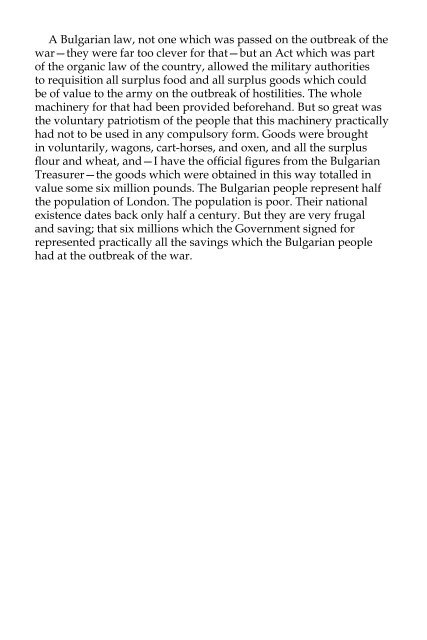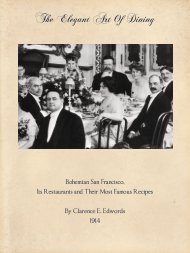Bulgaria e-book - iMedia
Bulgaria e-book - iMedia
Bulgaria e-book - iMedia
You also want an ePaper? Increase the reach of your titles
YUMPU automatically turns print PDFs into web optimized ePapers that Google loves.
A <strong>Bulgaria</strong>n law, not one which was passed on the outbreak of the<br />
war—they were far too clever for that—but an Act which was part<br />
of the organic law of the country, allowed the military authorities<br />
to requisition all surplus food and all surplus goods which could<br />
be of value to the army on the outbreak of hostilities. The whole<br />
machinery for that had been provided beforehand. But so great was<br />
the voluntary patriotism of the people that this machinery practically<br />
had not to be used in any compulsory form. Goods were brought<br />
in voluntarily, wagons, cart-horses, and oxen, and all the surplus<br />
flour and wheat, and—I have the official figures from the <strong>Bulgaria</strong>n<br />
Treasurer—the goods which were obtained in this way totalled in<br />
value some six million pounds. The <strong>Bulgaria</strong>n people represent half<br />
the population of London. The population is poor. Their national<br />
existence dates back only half a century. But they are very frugal<br />
and saving; that six millions which the Government signed for<br />
represented practically all the savings which the <strong>Bulgaria</strong>n people<br />
had at the outbreak of the war.<br />
Chapter VII<br />
A War Correspondent’s Trials in <strong>Bulgaria</strong><br />
A sense of grievance was the first fruits of my experience as<br />
a war correspondent in <strong>Bulgaria</strong>. It was the general policy of the<br />
<strong>Bulgaria</strong>n army and the <strong>Bulgaria</strong>n military authorities to prevent war<br />
correspondents seeing anything of their operations. They wished<br />
nothing to interfere with the secrecy of their plans. There were only<br />
three British journalists who succeeded, in the ultimate result, in<br />
getting to the front and seeing the final battle of the first phase of the<br />
war, at Chatalja. There were over a hundred correspondents who<br />
attempted to go. Perhaps as I was one of three who succeeded, I do<br />
not think I, personally, have any reason to complain. But I found a<br />
good deal of vexation in the <strong>Bulgaria</strong>n policy, which was to prevent<br />
any knowledge of their plans, their dispositions, their strategy,<br />
and their tactics, from getting beyond the small circle of their own<br />
General Staff. Even some of their generals in the field were kept in<br />
partial ignorance. Officers of high standing, unless they were on the<br />
General Staff, knew little of the general plan; they were informed<br />
only about the particular operations in which they were engaged.<br />
This policy of secrecy was, however, a good thing from the point<br />
of view of getting to know the <strong>Bulgaria</strong>n people. If the military<br />
authorities had given me facilities to go with the army and see its<br />
operations I should have become familiar with the Headquarters<br />
Staff, perhaps with a few regimental officers, but not with the great<br />
mass of the army nor with the <strong>Bulgaria</strong>n people generally. But<br />
the refusal of facilities to accompany the army cast upon me the<br />
responsibility of trying to get through somehow to the front, and in<br />
the process of getting through I won to knowledge of the peasant<br />
soldiers and their home life.<br />
Ultimately the residuum of my grievance was not with the<br />
secretive methods of the <strong>Bulgaria</strong>ns—they were wise and necessary—<br />
but with the wild fictions which some correspondents thought to be<br />
the proper response to that policy of secretiveness.<br />
Returned to Kirk Kilisse from the <strong>Bulgaria</strong>n lines at Chatalja, I<br />
amused myself in an odd hour with burrowing among a great pile<br />
of newspapers in the Censor’s office, and reading here and there the<br />
war news from English, French, and Belgian papers.





